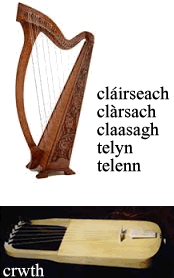As there’s an independence referendum in Scotland today I thought I’d look at a few relevant words in Scottish Gaelic and Scots:
| Gàidhlig (Scottish Gaelic) | Scots | English |
|---|---|---|
| reifreann [rʲɛfərʲɛn̪ˠ] | referendum | referendum |
| rneo-eisimeileachd [n̪ˠʲɔ eʃɪmələxg] | unthirldom | independence |
| neo-eisimeileach [n̪ˠʲɔ eʃɪmələx] | unthirlit | independent |
| bhòt [voʰt̪] | vote | vote |
Etymologies
– neo-eisimeileachd: from neo- (un-), from Irish neamh-/neimh-, from Middle Irish nem, from Old Irish neb-, neph-; and eisimeil (dependence, obligation), from Middle Irish esimol [source]
– referendum: from the Latin referendum (“that which must be referred” or lit. “thing brought back”), from referre (to bring or take back), from re- (back) and ferre (carry) [source].
– independent: from in- (not, opposite of) and dependent, from French indépendant, from dépendant, the present participle of dépendre (to hang down; to depend), from Latin dependentem, from dēpendēo (to hang down/from; to depend on) from pēndēre (to droop, to hang (from), to slope, to slant) [source]
– vote: from Latin vōtum (promise, dedication, vow; determination, will, desire; prayer), a form of voveō (I vow/promise; dedicate/devote to a deity; I wish/desire.), from Proto-Indo-European *h₁wogʷʰ-. [source]
Independence in Scots is either independence or unthirldom, a word I found on Spawk. It also appears on Wikipedia, along with unthirlt (independent) in the sentence:
“Scots unthirldom is the poleetical muivement that thinks Scotland shoud poleetical sinder itsel frae the Unitit Kinrick, an become an unthirlt kintra wi ane govrenment an a sovereign pairlament.”
(Scottish independence is the political movement that thinks Scotland should politically separate itself from the United Kingdom, and become an independent country with its own government and a sovereign parliament.)
– unthirldom and unthirlit come from unthirl = land outside the Sucken* or Thirl** of a particular mill; the dues paid to a mill for the grinding of corn grown on land not restricted to it [source]
– unthirlit also means not enslaved or subjugated (to another)
* Sucken [′sʌkən] = the lands of an estate on which there was an obligation to grind corn at a certain mill, or the totality of the tenants of such lands [source]
** Thirl [θɪrl] = To lay under a certain obligation or restriction, specifically in Scots Law: to bind the lands of an estate or their tenants by the terms of lease to have the grain produced on the lands ground at a certain mill, to astrict the grinding of corn [source].


